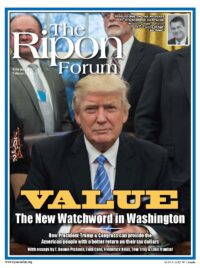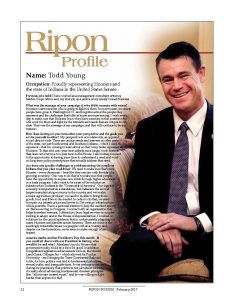Occupation: Proudly representing Hoosiers and the state of Indiana in the United States Senate
Previous jobs held: I have worked as a management consultant, attorney, Marine Corps officer and, my first job, as a janitor at my family’s small business.
What was the message of your campaign & why did it resonate with voters? Hoosiers want someone who is going to fight for them. In recent years, too many people have gone to Washington D.C. and forgotten about the people they represent and the challenges that folks at home are experiencing. I work every day to make sure that Hoosiers know they have someone in this position who will work for them and fight for the interests and needs that are unique to our state. That was the message of my campaign, and that will continue to be my mission.
How does having a 6-year term affect your perspective and the goals you set for yourself in office? My perspective is now statewide, as opposed to just district-wide. There are unique needs and interests in other parts of the state, not just Southcentral and Southern Indiana – which I used to represent – that I’m coming to learn about so that I may better represent all Hoosiers. To that end, a six-year term affords me a longer work-horizon that does not exist in a two-year term in the House. I am looking forward to the opportunity to having more time to understand a need and work on long-term policy prescriptions that actually address that need.
Are there any specific challenges or problems facing the people of Indiana that you plan to address? We need to make sure that every Hoosier – every American – feels like they can rise with the tide of a growing economy. One way to do that is to make sure that people have the opportunity to acquire new skills through higher education or a trade program. I also want to be a part of the solution on infrastructure. Indiana is the “Crossroads of America”. Our logistics economy is important as a standalone, but Indiana is the second largest manufacturing economy in the country and we’re also a major agriculture producer; we need to be able to bring those goods, food and fiber to the market. In order to do that, we need to repair our infrastructure and invest in 21st century infrastructure where possible. I have a personal mission to help the neediest among us. Before serving in Congress, I worked with an organization that helps homeless veterans, I offered pro bono legal services to couples looking to adopt, and in the House of Representatives, I worked on solutions for the opioid epidemic that is, unfortunately, plaguing too many Hoosiers and families across America. These are some of the seemingly intractable issues we grapple with as a country, and, despite our best intentions, never seem to make enough of an impact.
America marks another President’s Day this month. If you could sit down with one President in history, who would it be and why? Abraham Lincoln. He saw that government really could be a force for good. In addition to significant legislative achievements such as, the Morrill Land-Grant, Colleges Act – which allowed for Purdue University – and bringing the Trans-Continental Railroad to life, for him, politics was tied to fundamental principles, eternal truths, and inarguable facts. It was perhaps most stark during his presidency that politics is not just about winning, it’s really about advancing fundamental, timeless principles like, “all men are created equal,” and he was willing to fight harder than anyone for that.





